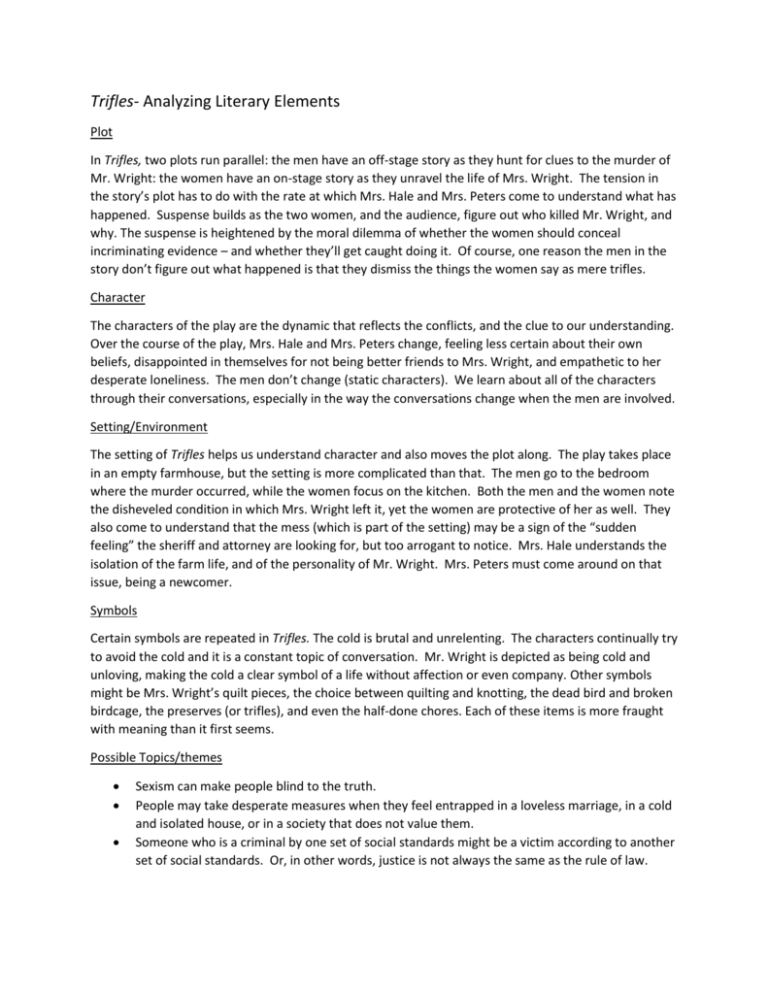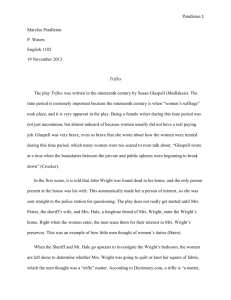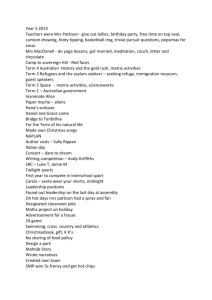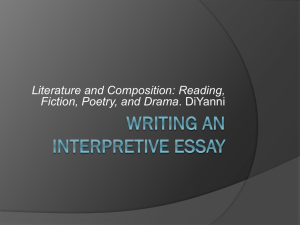Trifles explanation
advertisement

Trifles- Analyzing Literary Elements Plot In Trifles, two plots run parallel: the men have an off-stage story as they hunt for clues to the murder of Mr. Wright: the women have an on-stage story as they unravel the life of Mrs. Wright. The tension in the story’s plot has to do with the rate at which Mrs. Hale and Mrs. Peters come to understand what has happened. Suspense builds as the two women, and the audience, figure out who killed Mr. Wright, and why. The suspense is heightened by the moral dilemma of whether the women should conceal incriminating evidence – and whether they’ll get caught doing it. Of course, one reason the men in the story don’t figure out what happened is that they dismiss the things the women say as mere trifles. Character The characters of the play are the dynamic that reflects the conflicts, and the clue to our understanding. Over the course of the play, Mrs. Hale and Mrs. Peters change, feeling less certain about their own beliefs, disappointed in themselves for not being better friends to Mrs. Wright, and empathetic to her desperate loneliness. The men don’t change (static characters). We learn about all of the characters through their conversations, especially in the way the conversations change when the men are involved. Setting/Environment The setting of Trifles helps us understand character and also moves the plot along. The play takes place in an empty farmhouse, but the setting is more complicated than that. The men go to the bedroom where the murder occurred, while the women focus on the kitchen. Both the men and the women note the disheveled condition in which Mrs. Wright left it, yet the women are protective of her as well. They also come to understand that the mess (which is part of the setting) may be a sign of the “sudden feeling” the sheriff and attorney are looking for, but too arrogant to notice. Mrs. Hale understands the isolation of the farm life, and of the personality of Mr. Wright. Mrs. Peters must come around on that issue, being a newcomer. Symbols Certain symbols are repeated in Trifles. The cold is brutal and unrelenting. The characters continually try to avoid the cold and it is a constant topic of conversation. Mr. Wright is depicted as being cold and unloving, making the cold a clear symbol of a life without affection or even company. Other symbols might be Mrs. Wright’s quilt pieces, the choice between quilting and knotting, the dead bird and broken birdcage, the preserves (or trifles), and even the half-done chores. Each of these items is more fraught with meaning than it first seems. Possible Topics/themes Sexism can make people blind to the truth. People may take desperate measures when they feel entrapped in a loveless marriage, in a cold and isolated house, or in a society that does not value them. Someone who is a criminal by one set of social standards might be a victim according to another set of social standards. Or, in other words, justice is not always the same as the rule of law. At this point, focus on a potential theme from the play and then find some supporting lines that would be supportive of that claim. Developing a Thesis Statement First and foremost, you are analyzing the elements of the work in order to arrive at an interpretation; you should not be summarizing the work. If you start off with a thesis statement that argues for an interpretation of the play’s meaning, you will guard against summary. Examples: Summary: In Trifles, the women notice evidence that the men do not. Interpretation: In Trifles, the differences in the evidence the men and women notice suggest different worldview and value systems. The summary statement only tells what happened, the interpretative statement answers the question: Why do the women notice evidence the men do not? Summary: Mrs. Hale and Mrs. Peters discover a birdcage and dead canary, which provide clues to what actually happened to Mr. Wright. Interpretation: When Mrs. Hale and Mrs. Peters discover a birdcage and a dead canary wrapped in silk, they associated the silenced songbird with the joyless and repressed life that might have motivated Mrs. Wright to murder her husband and lessens the criminality of her act. The summary is accurate, even a bit inquiring, but not interpretive. Can you write an entire essay on my statement? Could anyone else see this differently? If the answer to both questions is yes, then you’re probably writing an interpretation. Starting with a specific prompt: How will this prompt affect our thesis development? In a conventional murder mystery, the point of the story is to figure out who the culprit is. The mystery in Susan Glaspell’s Trifles is unconventional, as the culprit is apprehended before the play begins. However, as Mrs. Hale and Mrs. Peters unravel the mystery of why the murder took place, the play’s themes are revealed. Discuss how Susan Glaspell uses the mystery of Trifles to reveal a theme of her play. Deconstructing the prompt must take place in order to understand it. In this case, you are being asked to consider a murder mystery plot not as the end itself but as a means of developing a theme. Essentially, this play is not really about a murder, but the themes could not quite originate without the murder. So, maybe Glaspell is asking us to reflect on the relationship between law and justice or to link justice and punishment. Did Mrs. Wright do wrong in being her husband’s judge, jury, and executioner? Was living with him punishment enough for her wrongdoing? Did she choose a punishment that fit his “crime”? These are the types of complex questions which will help you make an argumentative statement. The Working Thesis The first attempt at the thesis is called the working thesis. It is a start, but maybe rambling and not quite refined. But, it moves you towards your argument. The murder mystery in Trifles is solved, but it is not so easy to answer the questions that the mystery raises about law, justice, and punishment, and whether hard-and- fast rules that govern human relationships are always appropriate. However, does the play provide a conclusive answer to these questions? No. Perhaps a better route may be that Glaspell is asking the audience/readers to explore these issues. In Trifles, the murder mystery is the means Glaspell uses to explore whether the rule of law is always the same as justice. Still not what would be considered a developed thesis, but it is an argument and claim about the function of the play as a whole.









